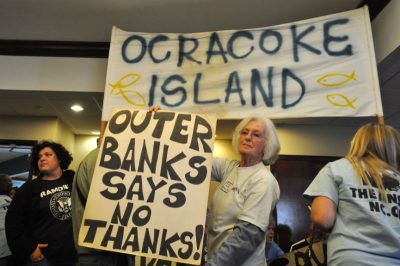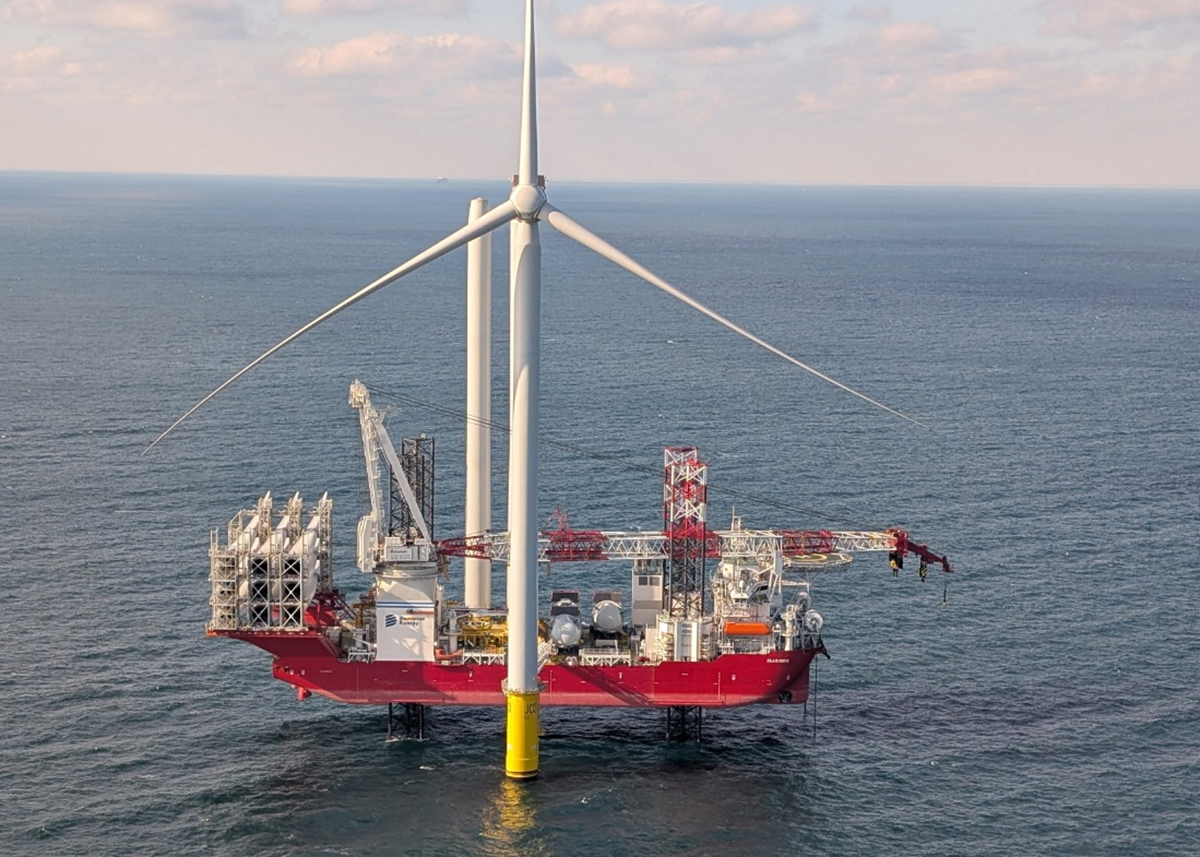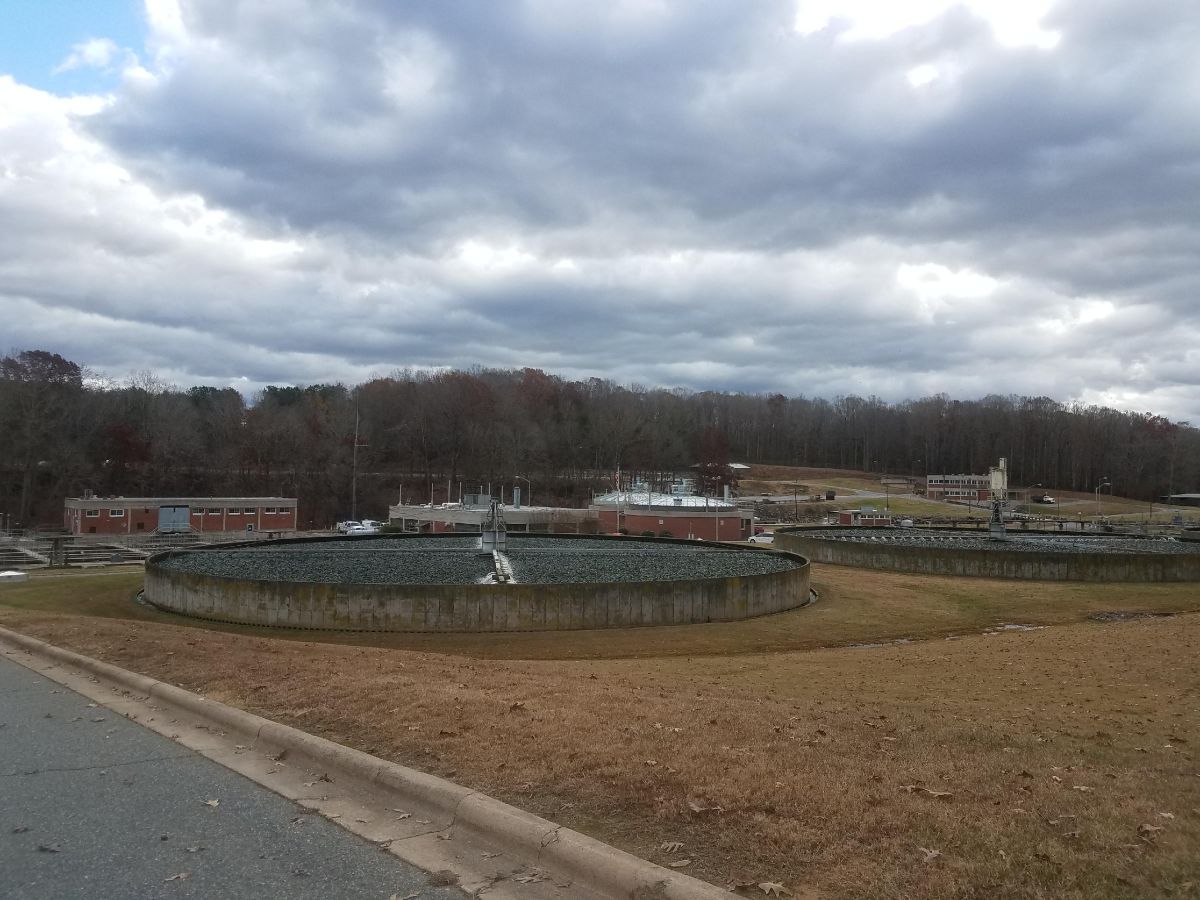MANTEO – Even as the Trump administration has put its East Coast offshore oil plans on hold, North Carolina’s environmental officials are rallying the forces to prepare a united front against the proposal.
“We have to remain vigilant in opposition to drilling off our coast,” Michael Regan, secretary of the state Department of Environmental Quality, said Wednesday at a roundtable of coastal mayors in Manteo. “Our message has not changed. We sent that message directly to Secretary Zinke and we’re prepared to deliver that same message to Secretary Bernhardt.”
Supporter Spotlight
David Bernhardt, who was recently appointed to succeed Ryan Zinke as Interior Secretary, told the The Wall Street Journal in an interview published April 25 that the agency had tabled Atlantic oil lease planning until the outcome of a court case on Artic drilling is decided.
Chairman Bob Woodard & @Townofnagshead Mayor Ben Cahoon are w/ @NCDEQ Sec. Michael Regan today at the “Mayoral Roundtable to Protect North Carolina’s Coast” to continue opposition to offshore drilling & seismic testing. #Dontdrillnc #obx #protectourcoasts pic.twitter.com/GNIRm6Zd9B
— Dare County (@DareCountyGovt) May 8, 2019
The administration in 2017 had proposed opening nearly 90% of the Outer Continental Shelf to oil and natural gas drilling in its 2019-2024 drilling plan, including nine potential, as yet unspecified, sites off the Atlantic coast.
It’s important that Washington sees North Carolina speaking in one voice against opening up the coast to oil exploration, Regan said.
“This is a much-needed conversation,” he said. “This is one of those issues in public discourse which is uniting us as proud North Carolinians and Americans.”
North Carolina Sens. Richard Burr and Thom Tillis, both Republicans, voted to approve Bernhardt, a former oil industry lobbyist, and currently support the administration’s proposal to open the coast for oil and gas exploration. Burr, however, had been opposed to drilling in the past and spoke out against lifting the oil drilling moratorium that had been put into effect during the George H.W. Bush administration.
Supporter Spotlight
“This is one of those issues in public discourse which is uniting us as proud North Carolinians and Americans.”
Michael Regan, DEQ Secretary
“North Carolina’s coasts are precious resources in our environment and for our state’s economy that must be protected,” Burr said in a June 2005 press release.
Nags Head Mayor Ben Cahoon said the roundtable was partly spurred when he shared with Regan the value of his monthly meetings with other Outer Banks mayors. The realization, they agreed, was that grassroots engagement starts with conversation, and that engagement with people can affect policymaking.
“Their stories have the power to change the hearts and minds,” Cahoon said.
Nearly all coastal communities have expressed opposition to drilling and seismic testing, citing the risk to the environment and marine life from oil spills and industrialization of the ocean.
It is also a huge economic risk, opponents say. Tourism in Dare County alone garners $1.2 billion a year, and visitors are coming for the great fishing and beautiful beaches, said Dare County Board of Commissioners Chair Bob Woodard.
“We cannot under any circumstance allow offshore drilling off our coast,” he said. “Folks, this isn’t partisan. Look at the lawsuits from Maine all the way to Florida. There is a mix of Democrats, Independents and Republicans.”
“Folks, this isn’t partisan. Look at the lawsuits from Maine all the way to Florida. There is a mix of Democrats, Independents and Republicans.”
Bob Woodard, Chair, Dare County Board of Commissioners
Woodard said he wants his grandchildren to be able to enjoy the beaches without having to worry about pollution. And the federal government, he added, hasn’t tried to sweeten the deal with promises of shared revenue or more jobs.
But examples of the risk, Woodard said, go beyond the famous Exxon Valdez and BP Deepwater Horizon spills. He cited the Taylor Energy spill in the Gulf of Mexico, which according to numerous news reports, has been leaking for more than 14 years, and continues to leak thousands of gallons of oil a day.
“Let’s keep this from happening,” Woodard said. “Folks, it ain’t worth it.”
The bottom line is that oil is not compatible with an economy and a lifestyle based on clean beaches and water, said Surf City Mayor Douglas Medlin.
“It kills everything,” he said. “We wouldn’t have anything, anywhere. All these families that grew up over all these generations wouldn’t have anything.”
‘Don’t Let This Happen to North Carolina’
Medlin recalled that a “small” oil spill from a Texaco tanker that broke apart during a storm off Cape Hatteras in 1971 resulted in months of oil pollution on the beach. And the Trump administration’s decision last week to ease drilling regulations offered no assurances, he added.
“Not strengthening,” Medlin said emphatically. “Easing!”
Howard Braxton, mayor of Topsail Beach, also recalled a minor oil spill from a grounded boat off Topsail Island about three years ago that blighted the beach.
“We were cleaning it for a week,” he said. “And he didn’t lose that much.”
Braxton said the incident reminded him of a conversation he had had about two years earlier with some folks from Texas, where oil wells are prolific.
“The only thing they said is, ‘Don’t let it happen to North Carolina,’” he recounted.
Plymouth Mayor Brian Roth said that as a retired military officer, he had seen many beaches around the world with “blobs” of oil washing up every day.
“It’s not necessarily just about today – it could be 20 years from now,” he said. “You can’t put that genie back in the bottle.”
In the tiny town of Duck, where the year-round population of 5,000 swells to about 22,000 beachgoers per week in the summer, Mayor Don Kingston said the town has already generated five resolutions against seismic testing and oil drilling since 2006.
“I think we could withstand a hurricane better than an oil spill,” he said.
Other mayors around the table included J. Andrew Syre, Bald Head Island; Ricky Credle, Belhaven; Bettie J. Parker, Elizabeth City; Horace C. Reid Jr., Hertford; Bobby Owens, Manteo; and Tom Bennett, Southern Shores. Steve Murphey, director of the Division of Marine Fisheries and Renee Cahoon, chair of the Coastal Resources Commission, also participated.
Parker, of Elizabeth City and who had previously served on the Pasquotank County Board of Commissioners, said she was instrumental in bringing the Amazon Wind Farm to the county, as well as solar farms.
“I think it’s very important that we focus on clean and renewable energy,” she said.
Pasquotank’s wind farm, which also straddles neighboring Perquimans County, is the first large wind energy operation in the state and the largest taxpayer in both counties.
A bill that is currently being considered in the North Carolina General Assembly would put most of the coast and much of the rest of the state off-limits to wind farms. The bill’s main sponsor, Sen. Harry Brown, R-Onslow, contends that the legislation is necessary to protect military operations, but the military is not opposed to wind energy and did not request the bill.
Parker read a letter from Elizabeth City manager Rick Olson emphasizing that oil spills affect more than ocean beaches. A spill would disperse throughout the state’s huge estuarine system, including the Pasquotank River.
“It would turn our beautiful waterfront into a cesspool,” Olson writes in the letter.
While updating the mayors on regulatory matters, Braxton Davis, director of the state Division of Coastal Management, said that the state has the right under the Coastal Zone Management Act to review and weigh in on a drilling plan, but its power is limited when it comes to stopping the federal government from offering lease blocks for auction.
Seismic survey projects, a separate but related process that would scan the ocean floor for signs of oil and gas deposits below, are currently on hold, he said. Applications from five companies have been submitted. Of them, one is going through a federal consistency review and four were found to be consistent with state laws.
Seasoned Fighters
Of the state’s coastal counties, Dare and Hyde are the seasoned veterans of battles against offshore drilling. Back in the late 1980s, Mobil Oil Corp. targeted a huge deposit of oil and gas about 45 miles off Cape Hatteras. Although the area, known as The Point, has never been surveyed, oil experts at the time estimated that the reefs could contain as much as 6 trillion cubic feet of oil or natural gas. At about 1.5 billion barrels of oil, the deposit is believed to be one of the largest off the East Coast.
But scientists say The Point, located at the confluence of the Gulf Stream and the Labrador Current, is an ecosystem wilderness with some of the most abundant numbers of marine and bird life in the world.
By the time Mobil submitted its proposal in 1990 to drill an exploratory well at the site, Outer Banks residents, along with local, state and federal elected officials and environmental nonprofit groups, had already united in full-throated opposition to the plan. A series of legislative maneuvers and lawsuits ensued, and Mobil Oil eventually withdrew its proposal.
In September 1997, Chevron USA notified the state that it was interested in drilling a well in the same area that Mobil Oil was targeting, despite the company’s own estimate that the chance of finding enough hydrocarbons in the frontier area for production was just 2 percent.
Outer Banks opposition quickly regrouped and to the surprise of many, in 1999 Chevron relinquished its leases, saying it would instead focus on interests that offered less risk and more profits.
Then about 10 years later, offshore drilling again became a political goal. In 2008, the moratorium on drilling in the Atlantic was lifted, but no lease sales have happened off North Carolina since the Chevron proposal. Some believe that the oil industry is still interested in The Point.
Owens said that he was “involved deeply” in the Mobil showdown, when he was serving as the chairman of the Dare County Board of Commissioners.
“It made friends out of enemies and enemies out of friends,” he recalled. “It was a battle. Now I see a big difference. There is a solid block against it. This is a representative group. We’ve got the whole coast of North Carolina sitting here.”








